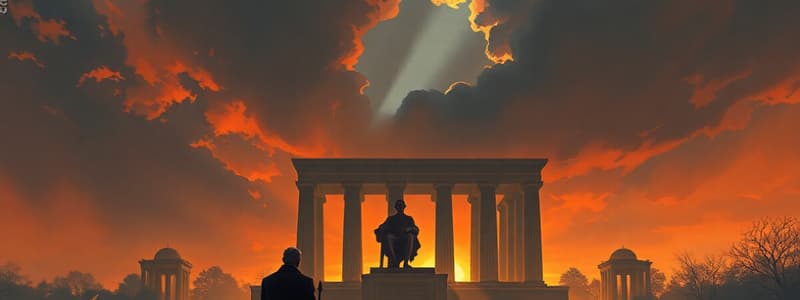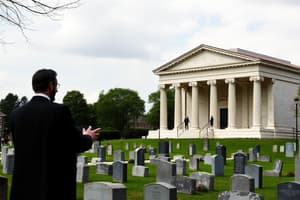Podcast
Questions and Answers
What event significantly improved Abraham Lincoln's mood during the Civil War?
What event significantly improved Abraham Lincoln's mood during the Civil War?
- The victory of the Union at Gettysburg (correct)
- The fall of Vicksburg (correct)
- The announcement of Lincoln's reelection
- The signing of a peace treaty
What did Lincoln compare the events of July 1863 to in his impromptu remarks?
What did Lincoln compare the events of July 1863 to in his impromptu remarks?
- The first shots of the Civil War
- The adoption of the Constitution
- The Declaration of Independence in 1776 (correct)
- The signing of the Emancipation Proclamation
What was Lincoln's initial reaction upon hearing the news of the Union army's victory?
What was Lincoln's initial reaction upon hearing the news of the Union army's victory?
- He was indifferent to the news.
- He felt overwhelmed with joy.
- He immediately planned a celebration.
- He experienced sadness and despondency. (correct)
How did the public in Washington react to the announcement of the victories?
How did the public in Washington react to the announcement of the victories?
Why did Lincoln hesitate to give a speech after the news of the victories?
Why did Lincoln hesitate to give a speech after the news of the victories?
Flashcards
Lincoln's reaction to Gettysburg and Vicksburg victories
Lincoln's reaction to Gettysburg and Vicksburg victories
Lincoln's mood changed from sadness to joy upon hearing of the Union's victories at Gettysburg and Vicksburg on the 4th of July, 1863.
Significance of Gettysburg and Vicksburg victory dates
Significance of Gettysburg and Vicksburg victory dates
The victories, occurring on the 4th of July (the anniversary of the Declaration of Independence), added symbolic weight and national pride, connecting past and present.
Lincoln's speech on July 4, 1863
Lincoln's speech on July 4, 1863
Lincoln, although not prepared for a speech, appeared at a window and reflected on the Declaration of Independence and the continuing fight for equality.
Public reaction to the news of the victories
Public reaction to the news of the victories
Signup and view all the flashcards
Lincoln's perspective on the war
Lincoln's perspective on the war
Signup and view all the flashcards
Study Notes
Lincoln's Gettysburg Address & Context
-
Lincoln's mood shifted dramatically after victories at Gettysburg (July 1, 1863) and Vicksburg (July 4, 1863)
-
The twin victories, occurring on the anniversary of the Declaration of Independence, evoked a profound sense of national pride and historical significance for Lincoln.
-
A large crowd gathered in Washington D.C. and demanded a speech from the President.
Lincoln's Understanding of Equality
-
Lincoln believed in the fundamental equality of all men, as defined by the Declaration of Independence.
-
He understood this equality as equal possession of inalienable rights, including life, liberty, and self-advancement, regardless of individual circumstances.
-
Lincoln considered American democracy a grand experiment, aiming to prove that self-government was a viable system.
The Challenge of Slavery
-
The existence of chattel slavery contradicted the principles of equality and democratic ideals.
-
Lincoln emphasized that the US founding fathers intended the eventual abolishment of slavery.
-
The Constitution contained compromises and omissions about slavery, anticipating its eventual demise.
-
However, slavery persisted and became a major threat to the experiment of popular government.
Lincoln's Perspective on Secession
-
Lincoln viewed Southern secession as an illegitimate act of rebellion against democratic principles.
-
He warned that the Southern Confederacy was founded on a rejection of democracy and constitutional rights.
Gettysburg Address and the Larger Question
-
Lincoln viewed the Battle of Gettysburg as a crucial moment in the struggle between democracy and tyranny.
-
Lincoln's Gettysburg Address prioritized the "unfinished work" of the Union soldiers, calling for a dedication to the ideals of democracy.
-
The speech focused on the larger implications of the sacrifice and the meaning of the nation's founding principles.
-
Lincoln proposed a vision of a renewed nation dedicated to the principles of the Declaration of Independence.
-
He saw Gettysburg as a crucial step toward the survival of democracy and a re-affirmation of the nation's principles.
Studying That Suits You
Use AI to generate personalized quizzes and flashcards to suit your learning preferences.
Description
Explore Lincoln's Gettysburg Address and his profound understanding of equality in the context of American democracy. This quiz delves into Lincoln's reflections after the significant victories at Gettysburg and Vicksburg, emphasizing his belief in the inalienable rights of all men and the challenges posed by slavery. Test your knowledge of one of America's pivotal historical speeches.




